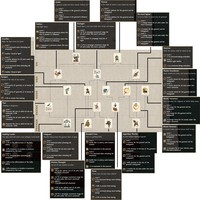Part 52: Appendix C - Characters/Agents
Appendix C - Characters/AgentsSou
Sou can inspire a friendly army or pacify an angry populace with their enlightened rhetoric, and, by the same token, demoralise an enemy force, reduce the chances of successful bribery, indoctrinate enemy agents and cause them to retire, or incite an enemy population to revolt. Sou are recruited via the Buddhist chain of buildings. The trusting nature of this man makes him highly susceptible to assassination by monomi, payoffs from junsatsushi or seduction by shirabyoshi.
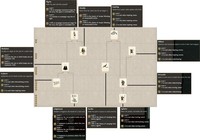
Shirabyoshi
The shirabyoshi is a traditional dancer who performs for nobles on formal occasions. Dressed as a man in formal Shinto clothes and white powdered make-up, the slow, rhythmic dances she performs in veneration of the gods, also involve poetry, singing and musicianship. The shirabyoshi's main skill is seduction, which convinces her target to join her lord's cause. Shirabyoshi are able to entertain the nobles of friendly castle towns in order to boost their growth and entertain friendly generals in the field, which increases their loyalty to the family and counteracts the efforts of enemy agents to bribe or seduce them into changing sides. She can also distract enemy armies with her alluring performances. Shirabyoshi can be recruited via the clan chain of buildings.
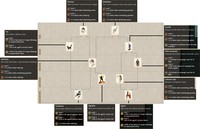
Monomi
The monomi acts as an assassin, spy, saboteur and scout, and is recruited from province speciality buildings. In addition to their subterfuge skills, monomi also increase the movement and line of sight of our armies when placed inside them. They can also establish spy networks within our castle towns, which increase the chances of discovering any rival agents and armies that may be hiding within a province. Monomi are invisible to the enemy until detected. They are vulnerable to detection by junsatsushi and exceptionally dangerous to sou.
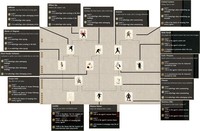
Junsatsushi
Junsatsushi are your secret policemen, recruited through the barter building chain. Junsatsushi ensure loyalty and obedience from friendly generals, increase income by preventing corruption, keep your castle towns and armies safe from enemy subterfuge when positioned inside them, and can request the allegiance of neutral and enemy castle towns, along with any forces garrisoned there. Junsatsushi can also pay off rival agents. They are vulnerable to indoctrination by enemy sou and are exceptionally dangerous to monomi.
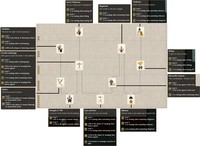
General
Generals are used to command armies and fleets in battle. Their command rating influences the effectiveness with which their army or fleet fights. When a force does not have a general one of the other units is assigned as the command unit. The command unit does not become a general's bodyguard, its unit type stays the same. In these cases the army fights with a severe disadvantage, as there is no-one to rally or inspire the troops, although the command unit does provide a small morale bonus. A successful battle fought without a general may result in the commander being offered for promotion to general. A general's loyalty to his daimyo, if low, can lead him to defect to an enemy clan. The daimyo is also a general, although in his case personal honour replaces loyalty. The daimyo's sons all become generals when they come of age. Generals can be assigned useful skills and retainers as they gain experience in battle and increase in rank. They can also be assigned commissions to convey additional bonuses.
